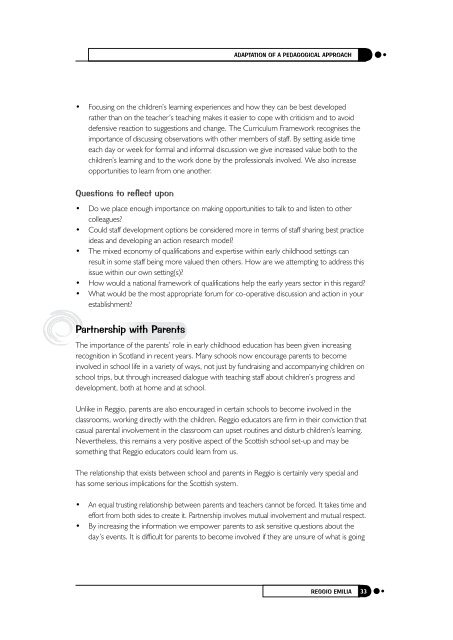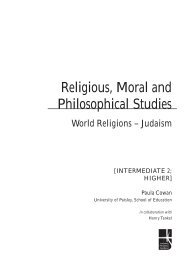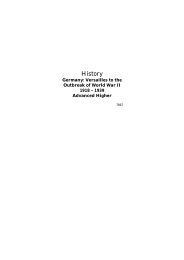The Reggio Emilia Approach to Early Years - Education Scotland
The Reggio Emilia Approach to Early Years - Education Scotland
The Reggio Emilia Approach to Early Years - Education Scotland
Create successful ePaper yourself
Turn your PDF publications into a flip-book with our unique Google optimized e-Paper software.
• Focusing on the children’s learning experiences and how they can be best developed<br />
rather than on the teacher’s teaching makes it easier <strong>to</strong> cope with criticism and <strong>to</strong> avoid<br />
defensive reaction <strong>to</strong> suggestions and change. <strong>The</strong> Curriculum Framework recognises the<br />
importance of discussing observations with other members of staff. By setting aside time<br />
each day or week for formal and informal discussion we give increased value both <strong>to</strong> the<br />
children’s learning and <strong>to</strong> the work done by the professionals involved. We also increase<br />
opportunities <strong>to</strong> learn from one another.<br />
Questions <strong>to</strong> reflect upon<br />
• Do we place enough importance on making opportunities <strong>to</strong> talk <strong>to</strong> and listen <strong>to</strong> other<br />
colleagues?<br />
• Could staff development options be considered more in terms of staff sharing best practice<br />
ideas and developing an action research model?<br />
• <strong>The</strong> mixed economy of qualifications and expertise within early childhood settings can<br />
result in some staff being more valued then others. How are we attempting <strong>to</strong> address this<br />
issue within our own setting(s)?<br />
• How would a national framework of qualifications help the early years sec<strong>to</strong>r in this regard?<br />
• What would be the most appropriate forum for co-operative discussion and action in your<br />
establishment?<br />
Partnership with Parents<br />
ADAPTATION OF A PEDAGOGICAL APPROACH<br />
<strong>The</strong> importance of the parents’ role in early childhood education has been given increasing<br />
recognition in <strong>Scotland</strong> in recent years. Many schools now encourage parents <strong>to</strong> become<br />
involved in school life in a variety of ways, not just by fundraising and accompanying children on<br />
school trips, but through increased dialogue with teaching staff about children’s progress and<br />
development, both at home and at school.<br />
Unlike in <strong>Reggio</strong>, parents are also encouraged in certain schools <strong>to</strong> become involved in the<br />
classrooms, working directly with the children. <strong>Reggio</strong> educa<strong>to</strong>rs are firm in their conviction that<br />
casual parental involvement in the classroom can upset routines and disturb children’s learning.<br />
Nevertheless, this remains a very positive aspect of the Scottish school set-up and may be<br />
something that <strong>Reggio</strong> educa<strong>to</strong>rs could learn from us.<br />
<strong>The</strong> relationship that exists between school and parents in <strong>Reggio</strong> is certainly very special and<br />
has some serious implications for the Scottish system.<br />
• An equal trusting relationship between parents and teachers cannot be forced. It takes time and<br />
effort from both sides <strong>to</strong> create it. Partnership involves mutual involvement and mutual respect.<br />
• By increasing the information we empower parents <strong>to</strong> ask sensitive questions about the<br />
day’s events. It is difficult for parents <strong>to</strong> become involved if they are unsure of what is going<br />
REGGIO EMILIA REGGIO EMILIA

















